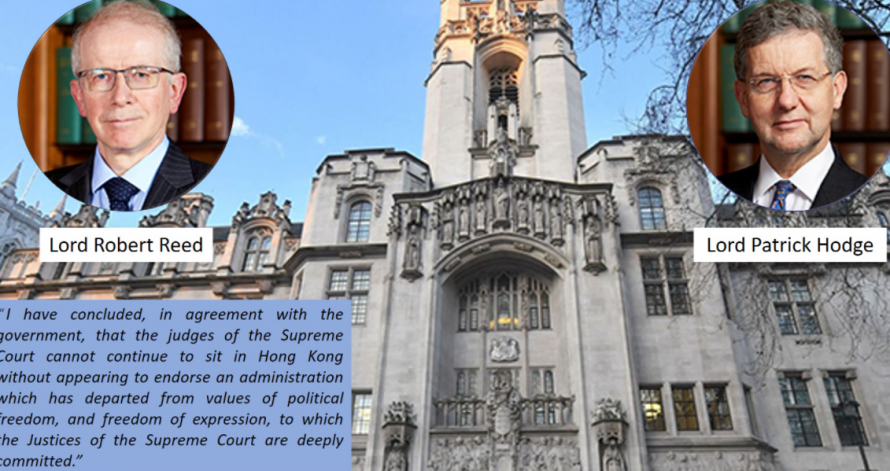Widgetized Section
Go to Admin » Appearance » Widgets » and move Gabfire Widget: Social into that MastheadOverlay zone
The two most senior British judges in Hong Kong have resigned. Britain will no longer send judges to Hong Kong
As the most senior judge in Hong Kong, Mr. Cheung reiterated that the judiciary is committed to upholding the rule of law and an independent judiciary. Judges at all levels will continue to uphold their judicial oath and will not be changed by the departure of British judges. Du Gan-kun, chairman of the Bar Association, acknowledged that the resignation of British judges would have an impact on judicial independence in the short term, but urged the public not to jump to conclusions at this stage. He and the two bar associations both stressed that they do not want other non-permanent overseas judges who are also Hong Kong’s court of Final Appeal to resign. Establishment lawyers and members of the legislative council’s legal community have suggested that retired judges from other common law systems, including Singapore, Malaysia, India and even Brunei, could be considered.
The Office of the Chinese Foreign Ministry commissioner in Hong Kong was the first official reaction to the news that Lord Robert Reed, president of the UK’s Supreme Court, and Lord Patrick Hodge, deputy President, had resigned as judges of the Hong Kong Court of Final Appeal. The spokesman for the bureau warned the British: play “judge” brand to political manipulation is in vain, “said under the title, and refers to the British side despite successful practice of rule of law in Hong Kong, ongoing political manipulation, attempt to through” foreign judges “brand, against the Chinese government policy in Hong Kong and discredit the rule of law development in Hong Kong, fully exposed to the destruction of” one country, two systems “and the Hong Kong of the rule of law order. The spokesman urged the British side to stop such political theatrics immediately.
On Hong Kong’s chief executive secretary moths also issued a statement after two hours, the two judges according to the British government decided to resign, feel “regret and disappointed”, the government can only helpless to accept, but was strongly opposed to “refers to two judges resigned and implement the national security act” the Hong Kong or Hong Kong and Hong Kong’s freedom of speech and political freedom on false charges.” The Government also expressed “deep regret” over the British government’s decision to withdraw from the 1997 agreement to place sitting British judges as non-permanent judges in the final court.
She stressed that allegations that Hong Kong’s governance had deviated from the human rights and freedoms of Hong Kong people under international covenants or that the reasons for the judges’ resignation were “overgeneralizations without any substantive evidence”. Speaking at a regular press conference this morning, she added, “It is a false statement that taking a part-time position as a judge in Hong Kong could be seen as a rationalization of the local government. I am deeply concerned that there is political manipulation behind the resignation of the judge.” She reiterated that Hong Kong still has excellent judges and has great confidence in the rule of law in Hong Kong.
However, the former chairman of the Bar Association, Mr Chan King-sang, believes that it is up to the international community, especially the common law area, to assess whether the status of The courts in Hong Kong has been affected by the incident. It is not helpful for the Government or politicians to boast about the health of judicial independence. In his view, the system of non-permanent judges is a good system to demonstrate that Hong Kong has a genuine common law system in line with that of other common law jurisdictions, rather than one that breeds a distinctive but unsuited common law system. Elman Yeung, a law professor at the University of Hong Kong, worries that it may become more difficult to appoint high-profile judges with links to foreign governments, and that the search for retired judges will continue.
In Britain, Prime Minister Boris Johnson told Parliament he appreciated and understood the resignations of two judges who felt they could not continue their work in the way they wanted because of security laws. Dominic Rennie Raab, the UK justice secretary, said Hong Kong’s post-security situation was too far from liberal for the UK to send sitting British judges to Hong Kong.
Meanwhile, a number of MPS from the ruling Conservative Party criticised Hong Kong’s use of national security laws to suppress dissent and press freedom during a parliamentary debate yesterday. British judges should not help authorise a legal system that detains Hong Kong people without due process. The motion’s tabling member, Mr Sze Chi-on, questioned whether there was a genuine common law in Hong Kong and called on private practitioners to reflect on whether they should stay in Hong Kong.


